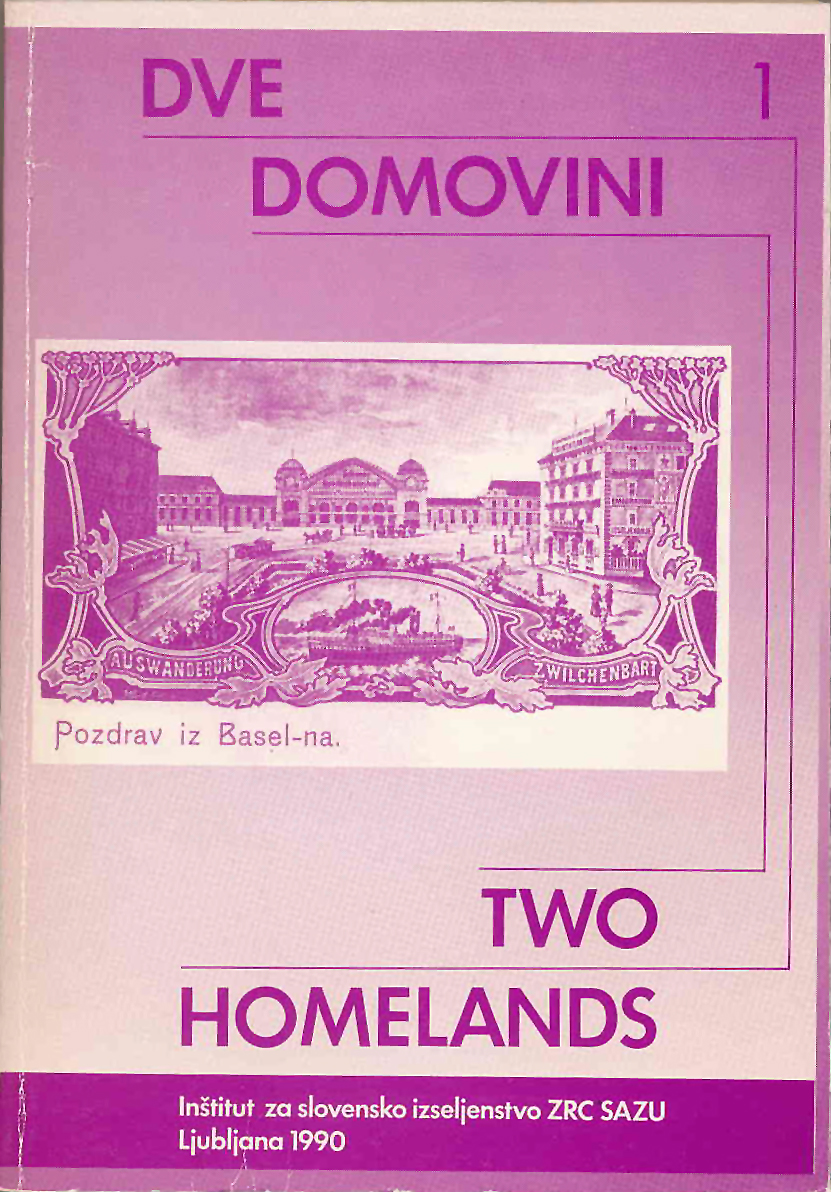Some Ideas on the Cooperation between Slovenes and their Descendants in the Homeland and those Abroad
Abstract
The paper draws from theoretical sociological premises on research in international migrations and from a theoretical outline of a common Slovene cultural space based on cooperation among various categories of Slovenes - those in the homeland and neighbouring countries, as well as Slovene emigrants and their descendants. The idea of a common Slovene cultural space and the awareness of Slovene emigrant communities worldwide have been studied on the basis of empirical results from polling done in Slovenia: Slovene Public Opinion 1987 and 1988 and Slovene Public Opinion 1988 - Opinion Setters. The central part of the article is an analysis of empirical data on the aspects of cooperation between Slovenes in their homeland society and those abroad, with the accent given to the manner in which Slovenia cooperates with Slovene communities worldwide.
Less ...
The author first presents some theoretical sociological premises relevant to research on international migrations. In this respect, he draws attention to conjunction of theoretical premises, referring to the inter-ethnic relations with communications, migrations, social and ethnic stratification and mobility. These theoretical premises are used to form a typology of emigrants, but they are also important for research into various types of migration policies.
Further developed is the idea of a common Slovene cultural space (Slovenia proper, Slovenes in neighboring countries, emigrants and their communities), which the author defines as a pluralistic social space - a reference to ethnic construction, within which occur various relations among the several categories of Slovenes and their descendants. He cites the reasons why the idea of a Slovene space is feasible: little concentration of this space, numerical smallness, underdevelopment of the Slovene nation.
In the empirical part of this paper, the author presents some discoveries about cooperation within the common Slovene cultural space, as shown in opinion polls in Slovenia, and especially in the polls among the opinion settlers – various professional categories of intellectuals. In Slovenia, the idea of a common Slovene cultural space has met with good reception and response. Results of studies on willingness to cooperate with various categories of Slovenes abroad and on different levels of awareness of Slovene emigrant communities are presented.
Empirical facts suggest ways in which to broaden and intensify mutual cooperation between Slovenia proper and the Slovenes and their descendants abroad. Major emphasis is given to the enhancement of scientific, economic and informational cooperation. However, proposals do not neglect cultural, athletic and political cooperation. In the latter case, foremost is the idea of taking into consideration the opinions of Slovene countrymen abroad whenever making decisions important for the development of Slovenia. Empirical research also reveals the obligations Slovenia has to the Slovene communities abroad and the manner implementing its cooperation with them. The order of proposals points towards an enhanced and increased flow of information material and its contextual improvement, cooperation with those Slovene communities abroad with which Slovenia does not yet cooperate, establishment of scientific Slovene institutions abroad, cooperation with institutions of Slovene communities abroad, support for education of Slovene countrymen in their homeland, providing information on the activities of Slovene communities abroad in the Slovene media, through cultural contracts, in Slovene schools abroad, and through cooperation in sports. Critical evaluations of the present level of cooperation and proposals for future cooperation show that cooperation among Slovenes and their countrymen should be realistic, open, pluralistic, integral, innovative, modern, multi-directional, dynamic, rational, of enhanced quality and that it should be spread into new areas within all autonomous categories of the common Slovene cultural space.
In the final section we read about the feasibility and actuality of mutual cooperation among all parts and categories of the common Slovene cultural space.
Downloads
References
P. Klinar, Mednarodne migracije, Obzorja, Maribor 1976.
W.R. Brubaker, ed., Immigration and the Politics of Citizenship in Europe and North America, Univ. Press of America, New York 1989.
R. Cohen, The New Helots, Migrants in the International Division of Labour, Avebury, Gower Publ. Co. Aledshot 1987.
Civil Rights and the Sociopolitical Participation of Migrants, Interna tional Migration Review, vol. 19, 71/85, New York.
P. Klinar, Mednarodne migracije v kriznih razmerah, Obzorja, Maribor 1985.
H. Korner, U. Mehrlander, Die Neue Auslanderpolitik in Europa, Neue Gesellschaft, Bonn 1986.
P. Vodopivec, Izkušnje Slovencev iz Jugoslavije, Naši razgledi 24. 3. 1989, str. 165, 169.
R. Lenček, Protislovna prihodnost Slovencev v ZDA, Naši razgledi, marec 1989, str. 194, 195.
Skupni slovenski kulturni prostor, Zbirka Plenuma kulturnih delavcev OF, Nova Gorica 1986.
Posvet o skupnem slovenskem kulturnem prostoru, Ljubljana, 17. 3. 1989.
T. Hribar, Slovenska državnost, Ljubljana 1989.
Slovensko javno mnenje, RI FSPN, Ljubljana 1987, 1988.
Slovensko javno mnenje - Mnenjski voditelji, RI FSPN, Ljubljana 1988.
Posvet Univerza za devetdeseta leta in prenos znanja, FSPN, Ljubljana 19. 4. 1989.
F. Mali, Posvet Univerza za devetdeseta leta in prenos znanja, Vestnik Univerze Edvarda Kardelja, Ljubljana 4/89, str. 184-192.
P. Klinar, Beg možganov in načini sodelovanja v slovenskem znanstvenem prostoru, Posvet Univerza za devetdeseta leta in prenos znanja, FSPN, Ljubljana, 19. 4. 1989, str. 11.
Downloads
Published
How to Cite
Issue
Section
License

This work is licensed under a Creative Commons Attribution-NonCommercial-NoDerivatives 4.0 International License.
Authors guarantee that the work is their own original creation and does not infringe any statutory or common-law copyright or any proprietary right of any third party. In case of claims by third parties, authors commit their self to defend the interests of the publisher, and shall cover any potential costs.
More in: Submission chapter





